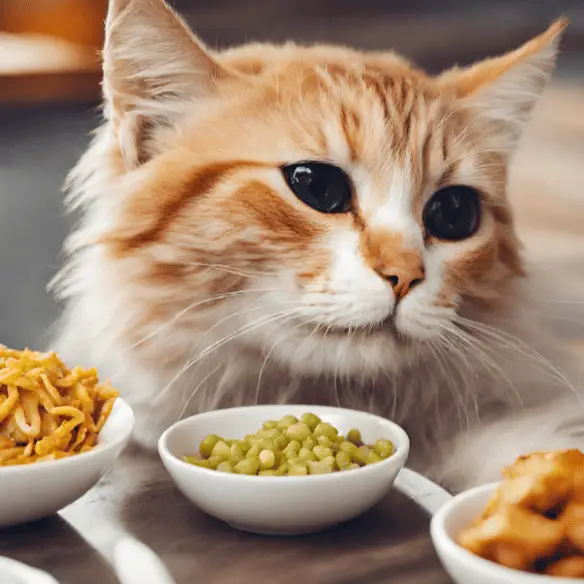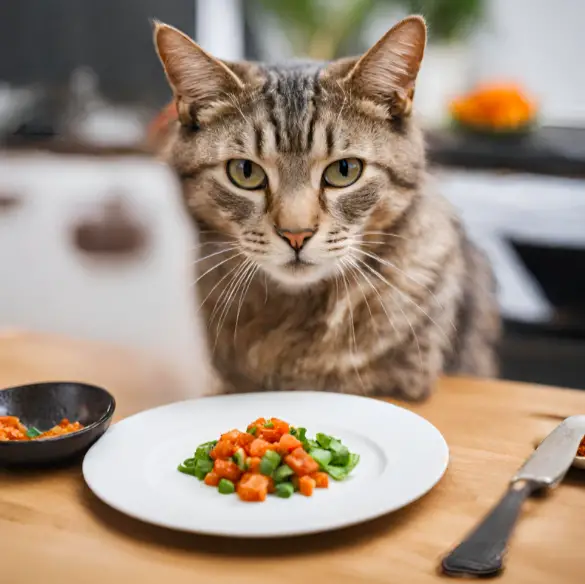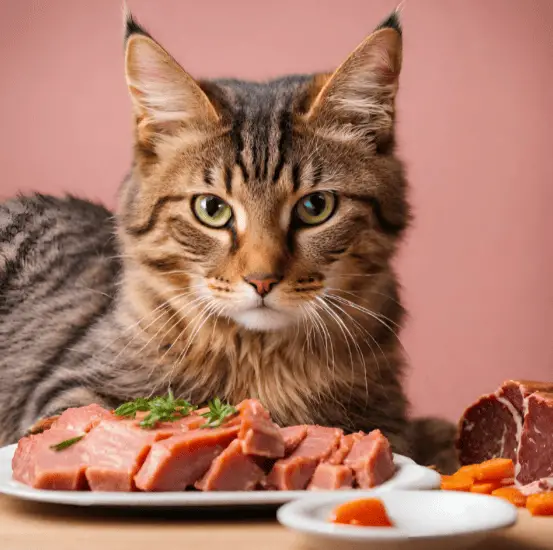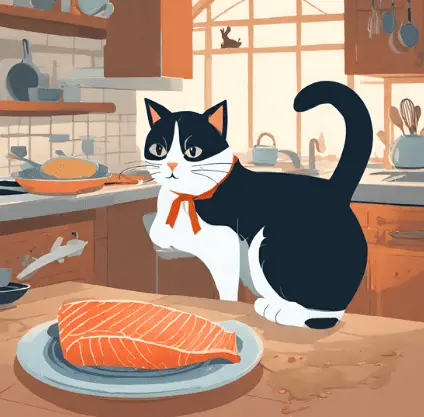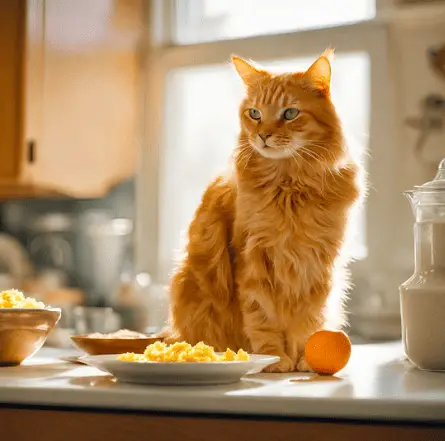
Are you wondering if it’s safe to feed your feline friend cooked food?
Feeding Felines: Is It Ok To Feed Cats Cooked Food? dives into the nutritional needs of cats and explores the potential benefits and risks of cooked food.
Discover homemade recipes and learn how to properly prepare cooked meals for your cat.
Transitioning from commercial cat food? Consult with a veterinarian for expert guidance.
Ensure your furry companion’s well-being with evidence-based information on feeding cooked food to cats.
KEY TAKEAWAY
Is it OK to feed cats cooked food?
While some cooked foods are safe for cats, it’s crucial to avoid toxic ingredients and ensure a balanced diet to meet their nutritional needs. Consult your vet for guidance.
The Nutritional Needs of Cats
You should always carefully consider the nutritional needs of your cat when choosing their food. Cats are obligate carnivores, which means their diet should consist mainly of meat. They require high levels of protein, amino acids like taurine, and certain vitamins and minerals that are found naturally in animal tissues.
Commercial cat foods are formulated to meet these requirements, providing a balanced diet that fulfills all their nutritional needs. These foods undergo extensive testing to ensure they meet the standards set by regulatory bodies such as the Association of American Feed Control Officials (AAFCO). They’re formulated to provide the appropriate levels of protein, fat, carbohydrates, vitamins, and minerals that cats need to thrive. Additionally, they may also contain other beneficial ingredients such as fiber to support digestion and antioxidants to support overall health.
Transitioning to the subsequent section about the benefits of cooked food for cats, it’s important to note that while commercial cat foods are designed to provide the necessary nutrients, some pet owners prefer to feed their cats cooked food.
Benefits of Cooked Food for Cats
There are several benefits to feeding cats cooked food, including improved digestion and reduced risk of foodborne illnesses. When you cook food for your feline companion, you provide them with a number of advantages that can positively impact their overall health and well-being.
- Enhanced Digestion: Cooking food for cats can make it easier for them to digest. The cooking process breaks down complex proteins and carbohydrates, making it easier for your cat’s digestive system to absorb nutrients effectively.
- Reduced Risk of Foodborne Illnesses: Cooking food kills harmful bacteria and parasites that may be present in raw meat or other ingredients. This reduces the risk of your cat contracting foodborne illnesses, which can lead to serious health issues.
- Customizable Nutritional Content: When you cook for your cat, you have control over the ingredients and their proportions. You can ensure that your cat receives a balanced diet tailored to their specific needs, which is especially beneficial for cats with dietary restrictions or health conditions.
Transitioning from the benefits of cooked food, it’s important to consider the potential risks associated with this feeding method.
Potential Risks of Cooked Food for Cats
Before discussing the potential risks of cooked food for cats, let’s explore the benefits of this feeding method. Cooking food for cats can provide several advantages.
Firstly, it helps to eliminate harmful bacteria and parasites that may be present in raw food. Cooking also increases the digestibility of the food, making it easier for cats to absorb the necessary nutrients. Additionally, cooked food allows for better control over the ingredients, enabling cat owners to customize the diet according to their pet’s specific needs.
However, it’s important to be aware of the potential risks associated with feeding cats cooked food. Cooking can lead to nutrient loss, as heat can destroy certain vitamins and minerals. Therefore, it’s crucial to ensure that the cooked food contains all the essential nutrients required for a cat’s optimal health.
Another risk is the potential for excessive cooking, which can result in the formation of harmful compounds such as acrylamide and heterocyclic amines. These compounds have been linked to an increased risk of cancer in humans and may pose similar risks to cats.
It’s also vital to avoid using ingredients that are toxic to cats, such as onions, garlic, and certain seasonings.
Homemade Cooked Food Recipes for Cats
Try out these 5 homemade cooked food recipes for your cats and see how much they enjoy it! Cooking for your feline companion can be a great way to provide them with a nutritious and delicious meal. Here are three recipes that aren’t only tasty but also packed with essential nutrients for your cat’s well-being:
- Salmon and Sweet Potato Delight:
- Ingredients: cooked salmon, mashed sweet potatoes, and a small amount of olive oil.
- Directions: Mix the ingredients together and serve in small portions. Salmon is a great source of omega-3 fatty acids, which promote healthy skin and fur, while sweet potatoes provide fiber and vitamins.
- Chicken and Rice Medley:
- Ingredients: cooked chicken, cooked rice, and a teaspoon of fish oil.
- Directions: Combine the ingredients and serve in appropriate portions. Chicken offers lean protein, while rice provides carbohydrates for energy. Fish oil adds omega-3 fatty acids, benefiting your cat’s heart health.
- Beef and Vegetable Stew:
- Ingredients: cooked ground beef, mixed vegetables (carrots, peas, and green beans), and a sprinkle of dried catnip.
- Directions: Mix the ingredients and serve in small portions. Beef is a good source of protein, and vegetables offer essential vitamins and minerals. Catnip can add excitement to the meal.
How to Properly Prepare Cooked Food for Cats
Make sure you follow the proper guidelines to prepare cooked food for your cats, ensuring their health and well-being. Cats are obligate carnivores, meaning their primary source of nutrients should come from animal-based proteins. When preparing cooked food for your feline friends, it’s crucial to provide a balanced diet that meets their specific nutritional needs.
To start, it’s important to consult with a veterinarian or a veterinary nutritionist who can guide you in formulating a recipe that suits your cat’s individual requirements. They’ll consider factors such as age, weight, activity level, and any underlying health conditions. A balanced cooked cat food recipe should include high-quality animal proteins, such as chicken or turkey, along with essential vitamins and minerals.
Additionally, it’s vital to cook the food thoroughly to eliminate any potential harmful bacteria or parasites. Cooking methods such as baking, boiling, or steaming can be used to ensure the food is safe for consumption. Avoid using seasonings, as some ingredients like onion and garlic can be toxic to cats.
Transitioning from commercial cat food to cooked food should be done gradually. Start by mixing a small amount of the cooked food with the commercial cat food, gradually increasing the ratio of cooked food over time. This gradual transition will help prevent digestive upset and allow your cat to adjust to the new diet more easily.
Transitioning From Commercial Cat Food to Cooked Food
When transitioning from commercial cat food to cooked food, it’s important to gradually increase the ratio of cooked food in their diet, allowing them to adjust to the new diet over time. Cats are known to be picky eaters and sudden dietary changes can lead to digestive issues. To ensure a smooth transition, follow these steps:
- Begin by introducing small amounts of cooked food alongside their regular commercial cat food. This will help them get accustomed to the new taste and texture without causing any gastrointestinal upset.
- Slowly increase the proportion of cooked food while decreasing the amount of commercial cat food in their meals. This can be done over a period of several weeks, allowing their digestive system to adapt to the new diet.
- Monitor your cat’s response to the transition. Look for any signs of distress such as vomiting, diarrhea, or loss of appetite. If any of these occur, consult with a veterinarian to determine the best course of action.
Transitioning to a cooked food diet for cats can offer various benefits, such as improved digestion, better coat condition, and increased energy levels. However, it’s crucial to ensure a gradual transition to minimize any potential digestive issues.
Always consult with a veterinarian to ensure the new diet meets your cat’s nutritional needs.
Consulting With a Veterinarian About Cooked Food for Cats
You should schedule an appointment with a veterinarian to discuss the benefits and potential risks of feeding your cat cooked food. While there’s a growing trend of feeding cats cooked meals, it’s important to seek professional advice to ensure the diet meets all of your feline companion’s nutritional needs. Cats have specific dietary requirements that differ from humans or even dogs, and it’s crucial to understand the potential implications of altering their diet.
Consulting with a veterinarian will allow you to have an evidence-based discussion about the benefits and risks of cooked food for cats. They can provide personalized advice based on your cat’s specific needs, age, and health condition. A veterinarian can guide you in creating a balanced diet that includes all the necessary nutrients, vitamins, and minerals that your cat requires for optimal health.
It is essential to consider potential risks associated with feeding cooked food to cats. Cooking can alter the nutritional composition of food, potentially leading to deficiencies in essential nutrients such as taurine, which is vital for a cat’s heart health. Moreover, certain foods that are safe for humans can be toxic to cats, such as onions, garlic, and some spices. A veterinarian can help you identify potential risks and provide guidance on how to avoid them.
Conclusion
In conclusion, while feeding cats cooked food may seem like a convenient option, it’s important to consider their specific nutritional needs.
While there may be benefits to cooked food, such as increased digestibility and reduced risk of certain foodborne illnesses, there are also potential risks such as nutrient deficiencies.
It’s crucial to consult with a veterinarian to ensure a balanced diet for your feline companion.
Remember, a well-informed approach is key to keeping your cat healthy and happy.

Stephanie Ansel is a well-known writer and journalist known for her unique and captivating writing style. She has written many articles and books on important topics such as the lifestyle, environment, hobbies, and technology and has been published in some of the biggest newspapers and magazines. Stephanie is also a friendly and approachable person who loves to talk to people and learn about their stories. Her writing is easy to read and understand, filled with lots of details and information, and is perfect for both kids and adults who want to learn about important topics in an interesting way.

